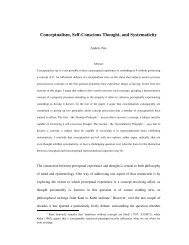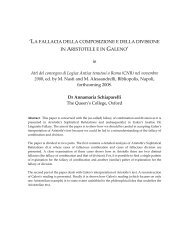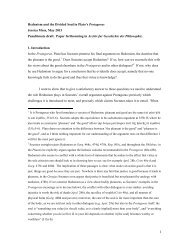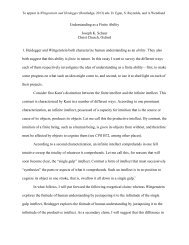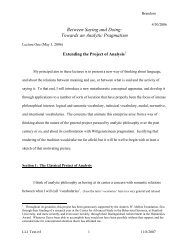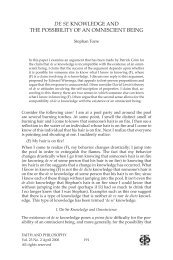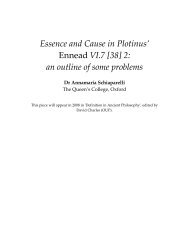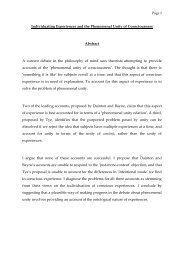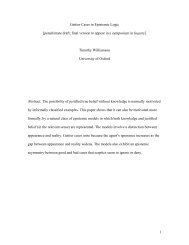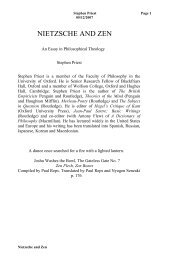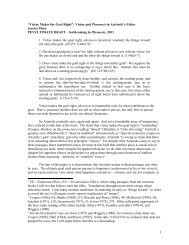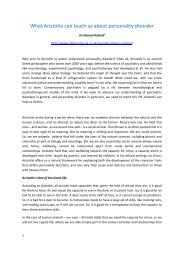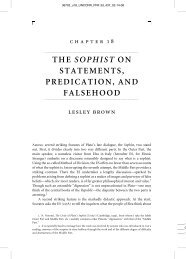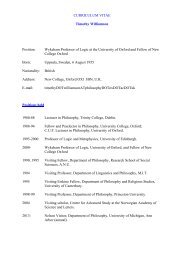The Geography of Genethics and the Ends of Life1 - University of ...
The Geography of Genethics and the Ends of Life1 - University of ...
The Geography of Genethics and the Ends of Life1 - University of ...
You also want an ePaper? Increase the reach of your titles
YUMPU automatically turns print PDFs into web optimized ePapers that Google loves.
puzzling. If one could have benefited by not having being born on account <strong>of</strong> <strong>the</strong> pain that<br />
one avoids, so too one can benefit from an early death on account <strong>of</strong> <strong>the</strong> pain that one<br />
avoids. But if Benatar accepts this point, <strong>the</strong>n he should accept a parallel point about <strong>the</strong><br />
evils <strong>of</strong> death <strong>and</strong> non-conception: since death can harm a person by depriving <strong>the</strong>m <strong>of</strong> <strong>the</strong><br />
benefits <strong>of</strong> life, so too non-existence can harm <strong>the</strong> non-existent by depriving <strong>the</strong>m <strong>of</strong> <strong>the</strong><br />
goods <strong>of</strong> life.<br />
In response, Benatar claims that his point is not that “it is better never to exist because one<br />
<strong>the</strong>reby avoids pains, but that it is better never to exist because one avoids pains without<br />
cost. <strong>The</strong> same is not true <strong>of</strong> death. Whereas death does spare one <strong>of</strong> all future pains, it<br />
does involve a cost” (personal communication). <strong>The</strong>re is something to this, but it is also<br />
somewhat mysterious. Death does exact a price, for it robs one <strong>of</strong> <strong>the</strong> goods that one<br />
would have enjoyed had one continued to exist (Feldman 1992; McMahan 2002). But <strong>the</strong>re<br />
is also a sense in which non-existence comes at a cost—namely, <strong>the</strong> goods that one would<br />
have enjoyed had one come into existence. Of course, strictly speaking, this cost is not<br />
incurred by anyone, for only <strong>the</strong> existent can be robbed. But, if we are speaking strictly,<br />
<strong>the</strong>n we must also note that it is equally true that only <strong>the</strong> existent can benefit from having<br />
dodged disaster. Insisting on strict speech threatens to undercut <strong>the</strong> very asymmetry that<br />
Benatar is at pains to defend.<br />
Perhaps <strong>the</strong>se points are most fully appreciated by considering death from <strong>the</strong> first-person<br />
perspective. Let us suppose that you are contemplating suicide, <strong>and</strong> that o<strong>the</strong>r parties will<br />
not be greatly affected by your decision. In deliberating about whe<strong>the</strong>r or not to commit<br />
suicide, it may seem reasonable to adopt a genethical stance towards <strong>the</strong> remainder <strong>of</strong><br />
your life. Call <strong>the</strong> subject <strong>of</strong> this life-segment “future-you”. You could bring future-you<br />
into being by deciding not to commit suicide, or you could make it <strong>the</strong> case that futureyou<br />
never exists by committing suicide. How should you decide? From a certain<br />
perspective, it seems reasonable to decide on <strong>the</strong> basis <strong>of</strong> what quality <strong>of</strong> life twin-you can<br />
be expected to enjoy: if it is good, <strong>the</strong>n deciding in favour <strong>of</strong> continued existence seems<br />
reasonable, if it is bad, <strong>the</strong>n deciding in favour <strong>of</strong> suicide seems reasonable. 9 Arguably,<br />
one doesn’t have any obligations to future-you to bring him or her into existence, although<br />
one might have duties not to bring certain types <strong>of</strong> future selves into existence. Thinking<br />
<strong>of</strong> oneself as faced with decisions about whe<strong>the</strong>r or not to allow (or bring) a future self<br />
into existence brings to <strong>the</strong> surface deep points <strong>of</strong> contact between coming into existence<br />
<strong>and</strong> staying in existence. Our lives are not given once <strong>and</strong> for all. <strong>The</strong> question <strong>of</strong> whe<strong>the</strong>r<br />
9 A slightly different way <strong>of</strong> addressing <strong>the</strong> question asks what kind <strong>of</strong> life you as a temporally-extended whole would<br />
enjoy were twin-you to come into existence.<br />
22



